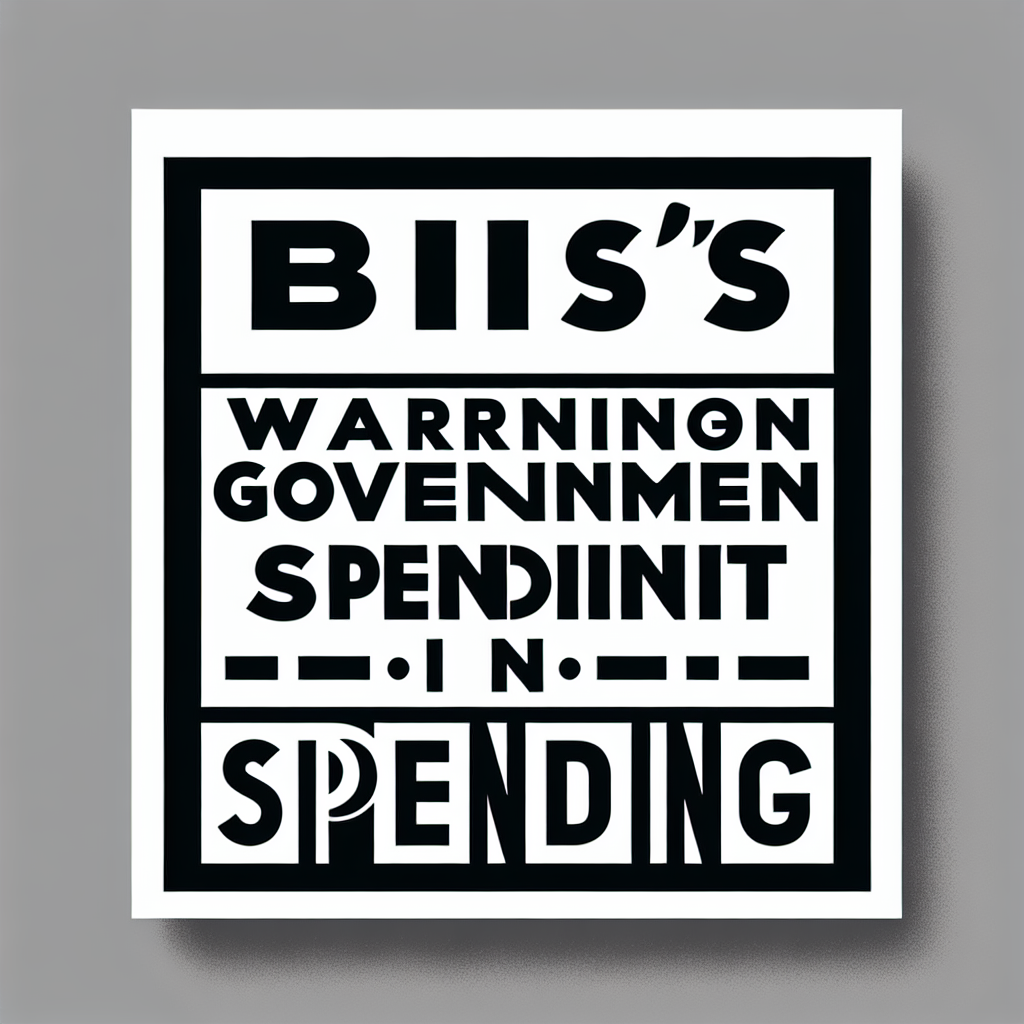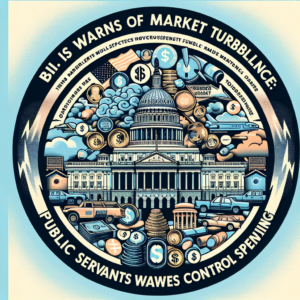
In a world where global markets are more interconnected than ever, the role of the Bank for International Settlements (BIS) is pivotal in providing insights into economic stability. Recently, the BIS has issued a stern warning: governments must rein in their spending or risk triggering severe financial turbulence. This warning is especially timely, as major elections are looming and fiscal policies are likely to take center stage. Understanding the BIS’s concerns and the broader implications of government spending is crucial, especially as the world continues to face economic uncertainty.
What is the BIS and Its Role in Global Financial Stability?
The Bank for International Settlements (BIS), founded in 1930, is an international financial institution that serves as a hub for central banks and other financial institutions. Often described as the “central bank for central banks,” its primary role is to foster monetary and financial stability across the globe. The BIS does this by providing a platform for central banks to discuss policy issues, share information, and develop standards for financial regulation. It also serves as a lender of last resort to central banks in times of crisis, ensuring that the global financial system remains stable during times of stress.
As a trusted advisor to central banks and policymakers, the BIS has a unique perspective on global financial risks. Its insights are grounded in extensive economic research and an understanding of the challenges faced by economies worldwide. This makes its warnings, such as the recent one on government spending, especially important for understanding potential economic outcomes.
BIS’s Warning on Government Spending
The BIS’s recent warning highlights the risks posed by excessive government spending, particularly during election periods. Governments, driven by the desire to secure electoral success or manage economic crises, often resort to large-scale fiscal stimulus measures. While such policies may offer short-term relief, the BIS argues that they could have dangerous long-term consequences. Specifically, high levels of public debt, exacerbated by excessive spending, could trigger market volatility, higher interest rates, and inflationary pressures.
The BIS’s cautionary stance is based on the belief that unchecked government spending could lead to a “debt trap,” where countries are forced to borrow even more to service existing debt. This situation could weaken investor confidence and lead to a rise in borrowing costs. Furthermore, governments might be compelled to raise taxes or cut public services to reduce debt, which could lead to social unrest.
Impact of Rising Debt on Global Financial Markets
Rising government debt is a key concern for the BIS, as it can have far-reaching consequences for global financial markets. As debt levels increase, so too does the cost of servicing that debt. If governments must allocate more funds to pay interest on their debt, they may have less room to spend on essential services or economic stimulus. This can create a vicious cycle, where higher debt leads to higher borrowing costs, which in turn exacerbates the financial strain.
One of the most immediate effects of rising debt is the pressure it places on interest rates. Central banks may be forced to raise rates to combat inflation or stabilize currency values, but this comes at a cost. Higher interest rates make borrowing more expensive for both businesses and consumers, which can lead to a slowdown in economic growth. Additionally, as borrowing costs rise, governments may be forced to implement austerity measures to reduce spending, potentially leading to social unrest.
Market turbulence often follows when investors lose confidence in a country’s ability to manage its debt. If investors fear that a country may default on its obligations, they may sell off its bonds, causing bond prices to fall and yields to rise. This, in turn, increases the cost of borrowing for the government and could lead to a vicious cycle of rising debt and declining market confidence.
The Link Between Elections and Government Spending
Elections are a time of political uncertainty, and governments often ramp up spending to win votes. In the run-up to elections, politicians may introduce short-term fiscal measures, such as tax cuts or increases in social spending, to appeal to voters. While these policies may be effective in the short term, they can have negative long-term effects on the economy.
The BIS specifically highlighted the risks of election-driven spending in its warning. Politicians, under pressure to meet the demands of their constituents, may implement policies that boost government spending without regard for long-term sustainability. This is particularly concerning in the context of the current global economic environment, where inflation is high, and debt levels are already at historic levels.
Historically, election years have been marked by increased government spending, as politicians seek to secure support through fiscal measures. However, the BIS warns that such policies can lead to financial instability if they are not carefully managed. When governments borrow excessively to fund these measures, they increase their exposure to financial market fluctuations, which can lead to volatility and market disruptions.
Fiscal Stimulus and Protectionism: Risks for the Future
Fiscal stimulus measures, such as government spending on infrastructure or direct payments to citizens, have become a common tool in addressing economic downturns. However, the BIS warns that continued reliance on fiscal stimulus in an inflationary environment could lead to unwanted consequences.
One of the key risks of excessive fiscal stimulus is that it can exacerbate inflation. When governments inject large sums of money into the economy, demand for goods and services increases. If this demand outstrips supply, it can drive up prices, leading to inflation. In an already inflationary environment, additional stimulus could make inflation harder to control, prompting central banks to raise interest rates.
The BIS also raised concerns about the rise of protectionist policies, such as tariffs and trade barriers, which are increasingly common in many parts of the world. Protectionism can lead to trade disruptions, reducing global economic efficiency and increasing costs for consumers. In a world where economies are heavily interdependent, protectionism can also lead to retaliatory measures from other countries, further destabilizing global markets.
The combination of fiscal stimulus and protectionism presents a dangerous cocktail for the global economy. While these policies may provide short-term relief, they are unlikely to address the underlying structural issues facing many economies. Instead, they could exacerbate inflation, disrupt global trade, and create long-term financial instability.
What Can Policymakers Do to Avoid Market Turbulence?
To avoid the market turbulence predicted by the BIS, policymakers must take a balanced approach to fiscal and monetary policy. One of the most important steps governments can take is to prioritize fiscal discipline. This means avoiding excessive spending during election years and focusing on long-term economic sustainability rather than short-term political gain.
Policymakers should also work closely with central banks to ensure that fiscal stimulus measures are targeted and temporary, rather than permanent. Central banks play a crucial role in controlling inflation and stabilizing the financial system, and they must remain vigilant to the risks posed by excessive government spending. By coordinating their policies, governments and central banks can ensure that economic growth remains stable while avoiding the risks associated with unchecked debt accumulation.
Another key recommendation is to avoid protectionist measures that could disrupt global trade. While protectionism may offer short-term benefits for certain industries, it can lead to long-term economic inefficiencies and higher costs for consumers. Policymakers should work to maintain open trade relations and avoid policies that could lead to retaliation from other countries.
Real-World Implications of the BIS Warning in 2024
The BIS’s warning is particularly relevant as 2024 approaches, with several major elections set to take place in key economies around the world. In the United States, the presidential election will undoubtedly result in heated debates over government spending, with both major parties proposing significant fiscal measures. Similarly, elections in Europe and Asia are likely to drive political leaders to increase spending in an effort to win support.
The global economy is already facing a number of challenges, including rising inflation, supply chain disruptions, and geopolitical tensions. These factors make the risks of excessive government spending even more pronounced. The BIS’s warning should be taken seriously by policymakers, who must carefully consider the long-term economic implications of their decisions.
As we look toward the future, it is clear that the global economy is at a crossroads. If governments heed the BIS’s warning and take steps to curb excessive spending, they can help stabilize the global financial system and reduce the risk of market turbulence. However, if governments continue to prioritize short-term political gain over long-term fiscal responsibility, the world could face a period of significant economic instability.
The BIS’s warning serves as a crucial reminder of the risks associated with excessive government spending. As elections loom and fiscal policies take center stage, policymakers must prioritize long-term economic stability over short-term political gain. By focusing on fiscal discipline, avoiding excessive stimulus, and working to maintain open trade relations, governments can help mitigate the risks of market turbulence and ensure that the global economy remains on a path to sustainable growth.
Visit our other website: https://synergypublish.com


